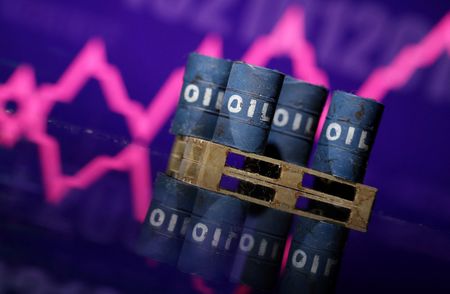By Laila Kearney
NEW YORK (Reuters) -Oil prices edged higher on Thursday as rising expectations that the Federal Reserve would soon cut interest rates, which could boost oil demand, outweighed concerns about an economic slowdown that could dampen fuel consumption.
Brent futures were up 20 cent to $85.28 a barrel by 1:10 p.m. EDT (1710 GMT). U.S. West Texas Intermediate (WTI) crude was up 40 cents at $83.25.
The number of Americans filing new applications for unemployment benefits rose more than expected last week, while initial claims for state unemployment benefits increased 20,000 to a seasonally adjusted 243,000 for the week ended July 1.
The data strengthened the case for the Fed to speed up rate- cutting plans, which could spur more spending on oil.
“I believe that healthy expectations of a Fed rate cut in the not-so-distant future will limit downside,” Tamas Varga of oil broker PVM told Reuters.
Fed officials said on Wednesday the U.S. central bank is closer to cutting rates given inflation’s improved trajectory and a labor market in better balance, possibly setting the stage for a reduction in borrowing costs in September.
U.S. economic activity expanded at a slight to modest pace from late May through early July, with firms expecting slower growth ahead, according to a report released by the Fed on Wednesday.
The rising jobless claims, however, also signalled an economic easing that could cut into crude demand, and kept oil prices from moving higher, said John Kilduff, a partner at Again Capital in New York.
“The reality on the ground is that we’ve got a slowing economy that could potentially soften crude oil demand,” Kilduff said.
Despite government data on Wednesday that showed U.S. crude inventories fell by 4.9 million barrels last week, more than forecast by analysts in a Reuters poll, weak U.S. gasoline demand kept oil prices from moving higher, Kilduff said. [EIA/S]
Chinese economic growth also weighed on oil prices. Chinese leaders signalled on Thursday that Beijing would stay the course with economic policy, though few concrete details were disclosed. Together, those events helped to check investor hopes of a push to boost consumption in the world’s second-largest economy.
(Reporting by Laila Kearney, Paul Carsten and Alex Lawler in London, Arunima Kumar in Bengaluru, Arathy Somasekhar in Houston and Jeslyn Lerh in Singapore; Editing by David Goodman, Elaine Hardcastle, Paul Simao and Jane Merriman)





